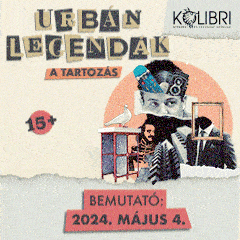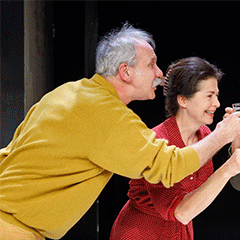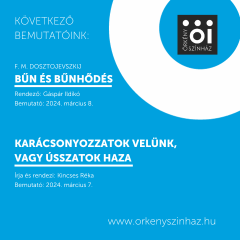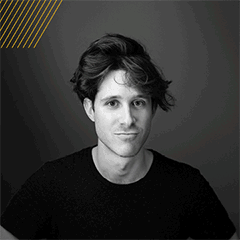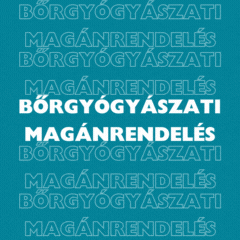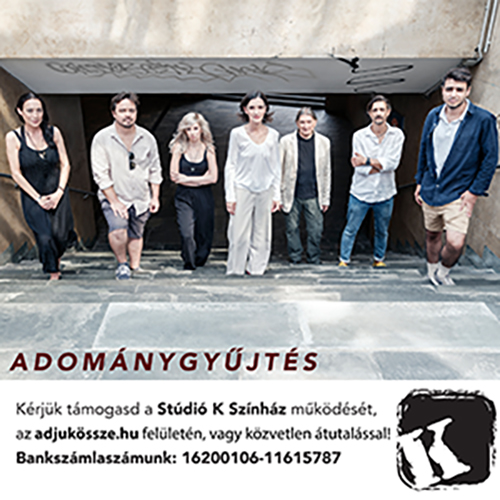I Never Knew Enough or Felt I Knew Enough
In the second season of our project of American – Hungarian collaborations, we would like to continue to deal with the problem of how to approach the question of PC (political correctness) when it comes to the performing arts. What is ‘diversity’ and how diversity appears? Who are the performers, directors, writers? How can we reconcile aesthetic freedom and the ethical need for diversity? These are burning issues today that László Upor explores with American artists, curators, and teachers of artistic higher education in the interview series continued at SZÍNHÁZ.
Todd London is a novelist, university professor, dramaturg, and author/editor of numerous articles and books on theatre. For almost two decades, he worked as the artistic director at New Dramatists in New York, providing a secure foundation and an inspiring creative environment for playwrights. Established in 1949, New Dramatists has served as a kind of writer’s incubator. The conversation covers topics such as the selection criteria of New Dramatists, expectations regarding the relationship between university professors and students, as well as the relative nature of the freedom of the American theatre, often looked upon with envy from Hungary, and the limiting influence of market expectations. And we get a glimpse behind the scenes of a production involving Native American participants.
Todd London, New York based writer, educator, former artistic director of New Dramatists in conversation with Laszlo Upor, dramaturg, translator, and university professor from Budapest.
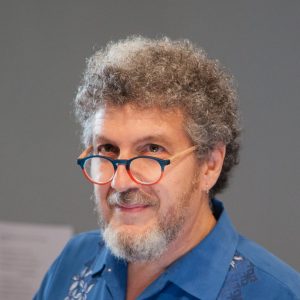
Quite recently, on your social media profile, I saw a picture of you with others and an old, battered van on the great American Prairie.
I spent several weeks this spring in South Dakota for the culmination of a theater project I’ve been following for four years, a collaboration between a 36-year-old theater company called Cornerstone Theater Company and a Lakota playwright named Larissa FastHorse. The project, a new play created with members of Lakota, Dakota, and Nakota communities across the state, is the third of a trilogy that Cornerstone and Larissa have developed over 10 years, but the first in her homeland, including the Rosebud Reservation where she was born. They worked in community for about 3 years and then out of their story circles and conversations and meetings, she wrote a play to address the concerns and issues she heard. She gives the community veto power over every word and action in the play through a series of public readings before they actually produce. They did a piece called Urban Rez in LA; they did a piece called Native Nations with forty members of many native tribes in Arizona. And this is their first time working in her own land.
I’ve been following this project since the beginning of the third piece. I took a trip with them in 2021 in the summer, which was their first in two years since they were halted by the pandemic. After a couple trips in ‘21 they were postponed again. Then they went back, and I went back for rehearsals in May, and then again for the beginning of performances and the beginning of a statewide tour in May and June.
They’ve toured the whole state, thousands of miles, with a van and a couple of rented cars.
And sometimes those cars just break down in the middle of nowhere, right?
In the middle of the Prairie. Yeah, you saw the pictures. It was the one time they didn’t have a four-wheel drive vehicle. A Toyota Camry. We were stuck in the sand in a road surrounded by fields for three and a half hours. The week before their van with everything for the tour leaked in the rain. All the sets were made out of this thick cardboard called hexacomb. So, it’s real old school, you know.
In what capacity did you travel with the company?
I was embedded like a journalist in war, you know. And I’m writing about the project now. It had five native actors, four of them had never been on stage before, and two from their professional company, one who is native but of a different nation in Southern California. And it’s beautiful. This is a piece about this trans youth who becomes a superhero after being helped out of a terrible situation by these superheroes, each of whom embodies a Lakota value or virtue. So, they’re working with Lakota, Dakota and Nakota people who are linguistically related and part of originally connected nations but have separated over the years.
But you were not involved as some kind of a dramaturg.
No, I helped them load and unload the truck while I was there. But I haven’t had any direct artistic involvement, I just hung out with them. An observer, close observer. And I wrote a press release while I was there because they’re so short-staffed. But no, my only involvement with them was when I was at New Dramatist, and we did a project with this company and one of our writers.
Cornerstone started as a bunch of kids right out of Harvard in 1986. And they went around the US, adapting classic plays with amateur actors and their professional company in small, small towns and rural communities. And then, about six years later, they settled in Los Angeles, and they started making plays on Skid Row and in Watts, which is a very poor black neighborhood. They did a cycle of plays in different faith communities and then brought them together. We gave them extra developmental time and some money for production on a different play as part of a national project called Full Stage USA while I was at New Dramatists.
How colorful was New Dramatists where you had served as Artistic Director for 18 long years starting the mid-90’s? With hundreds of people involved over this period, how wide was the range of playwrights?
Between 5 and 8 playwrights were selected by a changing panel every year for seven-year residencies. That means there were about 50 at any given time. New Dramatists was created in 1949 for playwrights who didn’t have any access to the Broadway theater, which was really the only theater at the time in the States. It was for emerging writers, but by the time I got there in 1996 it was so hard to get in that they tended to be playwrights in middle-career or early middle-career. But they ranged. Some were coming right out of Graduate School or with no Graduate School, and then we had playwrights who got in in their 60s and maybe even later. A couple who hadn’t been identified strictly as playwrights but were directors or members of ensembles. And sometimes people who just tried for years to get in before they hit the right panel.
And how about the artistic range?
It was pretty widespread. There are playwrights who wrote realistic plays, commercial writers, writers who wrote books for musicals in different forms, and then highly experimental and linguistic playwrights. In the selection panel every year five of the seven were writers of different eras. It tended to be a highly writerly group, as opposed to a commercial group. You didn’t get a lot of playwrights who wrote thrillers or conventional or genre plays, because it tended to favor literary or dramatic literary writers.
And the ethnic diversity?
It was very diverse. I used to say when I was there, that it was the most diverse artistic company in the country. And I believe that that was true. It had started as a group of mostly white men, though it was founded by a white woman with the assistance of these lions of the American theater, who at the time were all white men. By the time I got there, it was about half men, half women. And the demographics would change. The first wave of diversity was African American aplaywrights, black playwrights, and then more Latino playwrights. And then increasingly, Asian American playwrights. While I was there, there were no indigenous writers in the group that I knew of, or no one who identified that way. I would say that at any one time it was maybe between a third and a half, playwrights of color. Probably more commonly about a third and then overtime that shifted to half or more.
Modesty aside, were you “leading the way” or it all happened because times changed, and this was becoming the norm?
I didn’t lead it at all because I had no say in the admission process. There was a time I facilitated the process, but I never weighed in and it was an 8-month long process.
No influence, you mean none?
I facilitated the process, and I didn’t even read the plays until the final ones just so I could be conversant.
Then I rephrase the question. Was New Dramatists a leading force in this or following the tide?
I think it was a leading force, but maybe not a visible leader because it’s a humble kind of organization. It’s all developmental, it’s workshops, it’s a home for writers. It’s really meant for writers, to support other writers. To inspire and instigate each other. Before I got there, there was a time when it was heavily male dominated. And then in the early 70s, they made a decision as a membership that they needed to let women in and at a certain point, I think, many of the most exciting, influential writers were writers of color at any given time. So, I think, to the extent that it led, it led by leading with art, not by decisions about racial makeup or any kind of makeup.
I think the selection process really followed the writing and the writing that was most vital at any given time in our community. So, I believe, and this may be disingenuous, that it led by following where the vitality was in the writing community and who emerged.
However humble or low key this institution was, the most important thing, especially for the emerging author, is actually the development. It’s immensely important to get involved in these communities with much less on stake than a big production somewhere.
And there was cachet in getting in. I think when someone got into New Dramatists, people noticed, and they noticed the makeup and they noticed who was being elevated by getting in. So, I don’t think it was humble in that sense. And I was out in the world, and I was beating drums. And I had a national platform as a writer about theater and as a member of the theater community. That was part of it.
What do you think is missing most from the American theater today?
Subsidy. And I’m not really joking because though you are in the fires of governmental overreach and domination, we are in the fires of the whims of capitalist patronage. The effect is such that as the theater changes, and this is true especially in terms of demographics and race and gender of our leaders in the theater and the kind of work that’s being done, the wealthy white supporters and the foundations that have traditionally supported the theater are withdrawing. Or turning elsewhere. The government here, except for a very short window of time, has never been a strong supporter of the theater. So, what happens is the theater becomes so reliant on ticket sales. The art gets subsumed by the need to fill seats and you have these artistic leaders and these artists who have all these hopes and dreams and are constantly forced by economic necessity to postpone or compromise or make trade-offs to reach those dreams. We don’t have any sustaining support for ensembles that develop work over long periods of time. We have very few acting companies, only very limited support for resident playwrights or resident directors at all.
Brave New Theater World…
And so, we have this whole network of theaters across our nation that are bloated institutionally that artists feel alien from. And that are forced to do or have taken up the mantle of doing things that aren’t even the things that they set out to do or want to do. So, it’s not that I really dream of subsidy – because I see, for example, what you’ve gone through, and I see how subsidy becomes censorship – but I want the theater to be more central to our culture. I want the arts, I want culture to be more central in the US and it’s not. It’s a place of business and it’s a place of money and it’s a place of merger and it’s a place of domination and fight for territory, all of which I think don’t serve the theater very well. In my dreamworld the theater feels more like the theater of youth or of hippie days or something where people get together to make things together as an expression of their togetherness, whatever that means. But that is not sustainable and that’s only available to people with certain economic foundations. And so, the theater here has become a business, but it’s not a sustainable business. And it’s still economically exclusive.
You said that the supporters are withdrawing. Is there a specific reason for that or is that some long-existing tendency that now reached its high point and now we see that there is no support for theater anymore?
I think it’s so complex. It’s many things. Our theaters, which really are regional theaters and nonprofit art theaters, reach 50 to 70 years, and the audiences that built those theaters, which tended to be urban, upper middle class or wealthy white audiences, are aging and dying. The theaters that have been catering to those audiences don’t know how to develop new audiences because at some point they traded in audience engagement and development for marketing. They thought they could sell the theater instead of cultivating relationships with audiences. And so partly we lose audiences to age. Partly, we lose them to artistic impulse and mission, and change in the world. Partly, we lose them to pandemic, and they haven’t come back. Partly, we lose them to changing interests in the world. And they haven’t been and are not being replaced. The world keeps starting over and people have things to say. But the theater feels like an old-fashioned form, I think to lots of young people, and the theater, which has prided itself on being so live, hasn’t found a way to make the leap. Except in the most rarified circumstances.
![]()
When you teach – whether it’s teaching at university or consulting someone: a playwright, a theater-maker, a director, or just responding to questions – when you share your views with people who want to learn your views. In all these “teaching situations” what is your general strategy? What is the idea behind your teaching? Do you suggest people should dream and develop their skills to fulfill their own dreams and, hopefully, find their audiences? Or must learn about the real world and adjust their work, their talents, their ambitions to that reality?
I am hampered by a naïve idealism. I’ve never been able to teach the reality. I’ve never wanted to. I think it’s probably a limitation, but I think the truth is that my teaching, when it has been effective, has been effective because my idealism sparks other people’s idealism. And I actively think that everyone has unique gifts to offer, and that the only way through this world is to find out what their unique gifts are and help them flourish. I think that was my strength as Artistic Director at New Dramatist that –I can say unhumbly –I worked very well with lots of different kinds of writers, because I didn’t think it was important for them to succeed in the same way, or to be the same way. I don’t think there’s a structure of a play that has to be conformed to. I don’t think it’s worth our life’s precious time to find out the rules and then meet those rules. For me teaching is about inspiring people to believe in their own inspiration. That was my dramaturgical principle at New Dramatists. It was not to fix anybody’s play – it was to get them back to their desks. It was to get them to keep wanting to keep writing. To be jazzed by their own music. So that’s the principle. It’s not something I thought of and then tried to live. It’s just how I operate, I think.
If you’re old enough, you’re “wise” enough, you’re present enough, every encounter is a kind of teaching. So, you don’t have to be in a school or at a university. Every encounter is teaching. And, learning, of course.
I think that’s where I’ve sometimes failed with people who want to learn certain skills from me. I agree with you, every encounter is a kind of teaching, but it’s not every kind of teaching. Like I have no ability to lecture people about what they should do.
How does teaching relate to your other activities?
I feel like teaching is where I’ve learned the most, possibly because it’s been so important. I started teaching in the 80s, but it was a little bit random. I became an assistant professor at New York University in 1990-91 and taught there for four years. And during that time, that was probably the most learning I ever did about dramatic literature, because I was teaching dramatic literature and theater history. I had done my doctorate in literary studies as a way of getting out of the theater. I was going to be an English professor, but I got sort of sucked back into the theater. I was still directing. And so those first four years, which were really formative for me, were the years that I wrote lectures, I reread everything. I read things for the first time. I tried to make sense of this whole body of dramatic literature and really learn the theater history. And then I taught for 10 years at Yale School of Drama, mostly one class, a class about the founding visions for American theaters. And that was a very different kind of teaching because I was making a book with my students essentially. I then went to the University of Washington as the director of the school of drama and I taught a little bit, but I wasn’t really identified as a teacher. Then I came back and taught graduate playwrights and actors and directors at the New School here in New York. But there I was teaching collaboration skills and I felt like I knew about that. So that was exciting to me, and I was responding to their work rather than leading their work. So, the whole project of teaching was for me filled with uncertainty and dread because I never knew enough or felt I knew enough.
That is axiom one of teaching, right? You never know enough.
I didn’t know what it had to do with my specific projects, except to learn more. And I loved my students, but I only really got to know them when I was teaching full time. And it seems to me that the only kind of teaching that really works is when you really get invested in your students and know them. I was at a 70th birthday party for a really important teacher a couple weeks ago. And somebody said in a toast to her that she taught them about “teaching as friendship.” And it made so much sense to me because in the years that teaching made sense to me, it was because I became invested in the whole human, and they became invested in me as a human and as a teacher. And in the years when that wasn’t possible it felt like something wasn’t quite congealing or taking off, you know.
But if this is the case, and I think it very much is the case, how is this “teaching as friendship” principle limited or overruled by the new cautiousness of not getting involved with students in any ways?
I think the shape of it just has to be different. When you and I were younger – I don’t know if it was different in Hungary than in the States –but it was nothing to think of going out for drinks with a group of students. Leave aside any sort of sexual misbehavior, which we all know took place, though not in my room. I do think it’s just you have to be more careful. As with any relationships, even with staff relationships in an organization, the mores have changed, and the codes of ethics have maybe become more explicit. But I think mutual respect and admiration and dawning affection over time are real and they’re separate from the power dynamics. They are based on real investment in the other person’s whole self. We don’t have to be factory workers or specialized cogs in a larger wheel. We get into theater to be as much of ourselves as we can and we need to draw that out of our students, don’t you think?
Absolutely. But some find it frightening and a very slippery ground. Several people whom I spoke to say that university now is a dangerous place in many ways, and that’s a shame. Back then, on the basis of mutual respect, we could get as close to our students as we wanted to and as much as they wanted to, and it was always mutual. We were – are – among the lucky ones. Do you see this changing in the world of academia? Or is it just something passing, a short transition period?
Well, I hope it’s changing. I hesitate to speak as a we because we live in different cultures, but here we need to change the way people use their power, the way they use position to dominate. I grew up in a time where I knew that teachers were sleeping with students. I knew that certain teachers were always trolling the actresses, the beautiful young actors and actresses. And students needed things from their teachers that they weren’t even necessarily aware of. And I think it’s really good that that has changed, and I hope it changes forever. I believe in mutuality, and I believe that, especially in the theater, if we collaborate as equals, we have to learn to speak to each other honestly, but also respectfully, we have to understand intimacy and boundary. So, I hope it’s not passing. I don’t think it is. What I hope is passing is a sense that every relationship is dangerous, and that as an older male teacher, I have to be (and I haven’t felt this way, frankly) scared of my students, or that they feel they have to be scared or watchful about me, or that we can somehow cancel each other. I’ve never had any of that happening to me directly, though I’ve had to manage as a director of a school terrible violence between students in a cohort and abuses of power. And sexual abuses within the students and faculty and students. I wanted that to change, and I want the teaching environment to be less fraught.
Of your many hats – that is, artistic director, educator, dramaturg and writer – is there a single one more important than the others?
Depends on when you ask me. What day. I’m no longer an artistic director. I’m no longer an executive director. I’m no longer an educator, except in the most one-off way. I’m a facilitator of individual artists and companies, and I’m a writer and now the writing feels more important because I’m older and I want to make meaning out of all of it if I can. I can always count on my books. If I pull them off the shelf, they’re still there. I love that. Whereas if you pull relationships off the shelf, they aren’t necessarily all there. And the theater is so hard now. I mean, it’s always been hard, but I work with artistic directors and facilitate some communities of artistic directors in a way that’s not dissimilar from what I did with writers at New Dramatists, and I see what they go through. In contrast to their struggle, the writing feels purer. It feels like if I sit down at my computer, I can accomplish something over the course of a week. But I don’t know what’s most important.
So, you don’t see yourself as a man of theatre anymore. While I think, once a dramaturg, always a dramaturg.
Yeah, maybe that’s true. I never saw myself as a dramaturg, though I worked as a dramaturg. I mean, I was trained as a director and a writer, and then I tried to leave the theater and I came back, and early on I got hired as a dramaturg, when I didn’t even really know what it was, and as a literary manager. I never use that word to describe myself, though it does describe me as you know.
Forget about hats, how would you describe yourself then?
Well, it’s interesting that you said, “man of the theater.” One of my old bosses who was also a kind of mentor, was Robert Brustein who founded the Yale Repertory Theater and later the American Repertory Theater at Harvard. He was the Dean at Yale. And at some point, he insisted on being called a man of the theater. That was because he did many things too. And I used to think it was very pretentious and I wanted to say ‘oh, Bob, get off of it!’ But now I feel that at this age it’s the only way to describe oneself. So, I tend to deflate it and say I’m a “theater guy,” instead of a man of the theater. I am still that. And I don’t believe that my career is behind me. But I see myself differently in relation to it, based on age and stage of human development. I think it’s all part of a whole, though. If I could just be a novelist, I would just be a novelist. But I’ve never been able to just be a novelist.
I don’t think it’s healthy.
To just be a novelist? Do you think it’s healthy to just be a theater guy?
No, I think that doing various things, different things at the same time, or if not at the same time, then in different periods of our lives, makes a good balance. Things that are exclusively yours and things that you can only do in collaboration with others.
I’ve never been able to just do one. Partly it’s about being both extroverted and introverted. I want some things that are just for myself and other things that are dependent on other people. It’s so joyful and exciting to collaborate, except when it’s not. In which case it’s terrible and painful. I think you’re exactly right. It’s nice to be able to do more than one thing and to oscillate between them. And I keep thinking, because I’m finishing, I hope, a third novel, that when I’m done with it, I may not want to write fiction anymore. I may just want to write about theater and try and put it all together. To make meaning of the whole.

